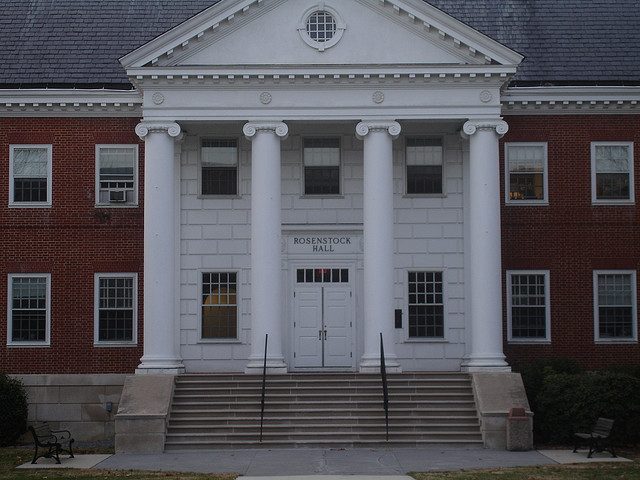
Rosenstock Hall will be vacated during the summer of 2013 to clear the building of many asbestos-containing materials and install a new fire alarm system.
According to John Wichser, director for facilities management of Hood College, in the fall of 2011, it was brought to the attention of college officials that many retired professors of the college, who had primarily worked in Rosenstock Hall, had developed cancer stemming from possible asbestos exposure.
“We hired a third party to obtain the medical records of the staff who worked and currently work in Rosenstock Hall to determine if any of their conditions were the result of asbestos exposure,” John Wichser said. “The tests results came back and said they were not.”
According to the United States Environmental Protection Agency’s website, asbestos is a mineral found in rock and soil and due to its strength and heat resistance it has been used in a variety of building construction materials for insulation and as a fire retardant.
The asbestos fibers are dangerous when they are released into the air by the disturbance of asbestos-containing material such as product use, demolition work, building or home maintenance, repair, or remodeling.
Asbestos has been known to cause lung cancer, mesothelioma (cancer that is found in the thin lining of the lung, chest and the abdomen and heart), and asbestosis (a severe non-cancer disease of the lungs).
Wichser said the college hired another team to come to the college and test the air quality of the building and to test for radon, asbestos, mold, and any other harmful toxins in the air. The tests resulted in a negative for all of the elements, except for radon.
Trace amounts of radon were found in the elevator shaft of the building.
Due to the outdated system of the fire alarm in Rosenstock Hall, the building will be vacated this summer to update the fire alarm system.
In addition, according to Wichser while the building is undergoing restorations, the college will have most of the asbestos-containing materials, except for the floor tiles, removed from the building.
Ceiling tiles and pipes will be replaced.
The facilities department also plans to paint and carpet the building.
Wichser also said that the process of removing the asbestos-containing materials will be a very safe procedure and all particles released by the construction will be sucked into a vacuum.
Wichser said that the restorations will cost the college about $750,000.
In a meeting on Tuesday, March 12, faculty and staff with offices in Rosenstock Hall were notified that they needed to remove all of their belongings before the beginning of the summer for renovations on the building.
“It’s going to be such a pain to move,” Heather Mitchell-Buck said, an assistant professor of English at Hood College who has an office on the second floor of Rosenstock Hall. “But I can’t wait to have carpet and fresh paint in my office.”
Other faculty members felt as if the situation is not being handled in the best way.
“They’re not telling us everything and we don’t know all of the test results- only some of them,” Robert Boyle said, associate professor of psychology and who also has an office in the basement of Rosenstock Hall.
In the spring of 2012, many faculty members with offices in Rosenstock Hall chose to move their offices to another building on campus.
Many of those faculty members now share offices on the fourth floor of the Beneficial-Hodson Library. In many cases, there are three to four professors per room.
Assistant professor of psychology Shannon Kundy, one of the faculty members who chose to relocate her office to the library, said she feels that Rosenstock Hall is not a fit place to work.
“We have seen that those who have been in the psych department for ten years are more their health outcomes are not so good,” Kundy said. “So far it’s six out of nine. We didn’t want to take the risk so we moved up here.”
Kundy also said she would not move back into the building.
“I’m worried for my health,” Kundy said. “I don’t plan on moving back after the restorations. The group of us decided our health was more important.”
Students voiced concerns to the college about the possibility of a potential health threat.
“I think it’s both morally wrong and obviously potentially harmful,” Chrissi Arnold said, a student at Hood College who has most of her classes in the basement of Rosenstock Hall. “I’m surprised more hasn’t been done to get students and faculty away from it.”
Other students said they feel that important information is being kept from them.
“I wasn’t even aware there was a problem until I heard some other student talking about it,” Carmelita Ugarte said. “Now that I know a little bit about it something should be done. I’m worried about people with allergies, that could be a serious problem.”